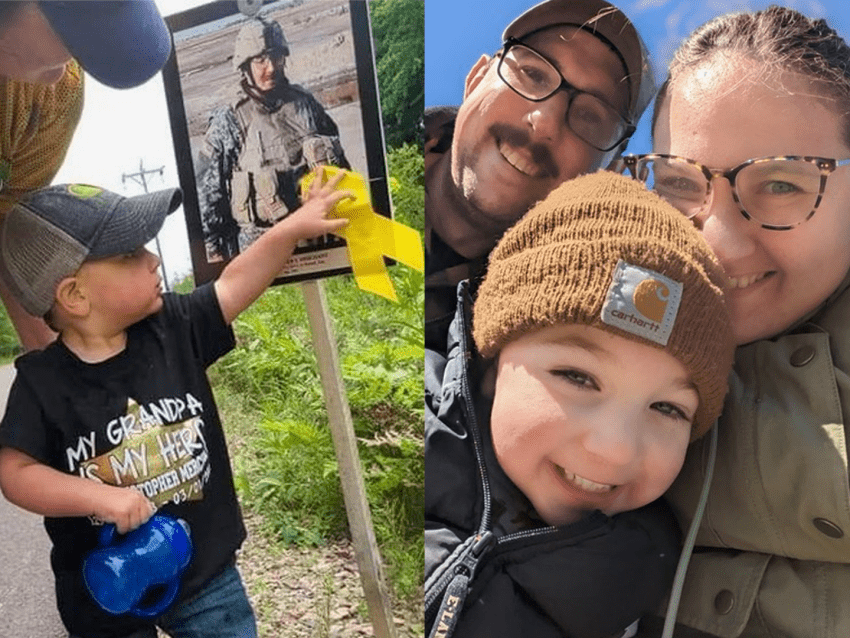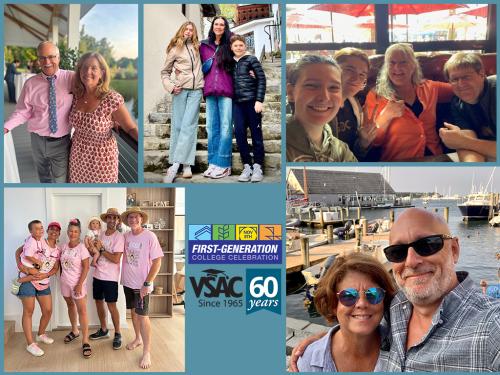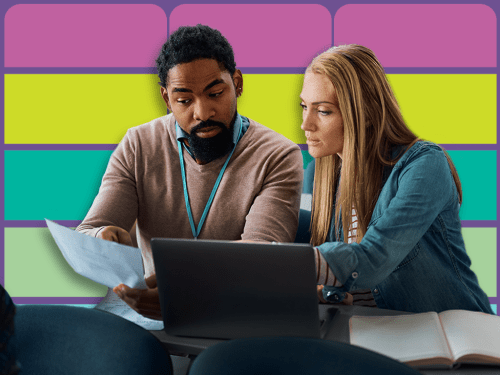Kristen Merchant Moore reflects on her father’s military service

Vermonter Kristen Merchant Moore is inspired to help youth after the death of her father, a Veteran.
Kristen Merchant Moore’s father always emphasized the importance of education. When he became one of the first Vermont National Guard members to die in the Iraq War in 2006, his service to his country and his community allowed Kristen to attend college for free under the GI Bill and a Knights of Columbus scholarship.
But the pain of grief dealt a devastating blow to the Merchant family, and Kristen – who was just 9 years old when her father died – struggled with the void left by his loss. With support from her guidance counselor at Hazen Union High School and her VSAC Outreach Counselor, Kristen navigated the college process as a first-generation college student. She earned her B.S. in Secondary Education and Mathematics from St. Michael’s College, becoming the first person in her family to earn a college degree. Now, as a mom and a case manager for a youth employment program, Kristen is helping the next generation find their paths in life.
In honor of Veterans Day, we asked Kristen to share her story.
“The military was a strong tradition in both of my parents’ families. My mom’s father and grandfather, and both of my dad’s grandfathers, had served. One of my dad’s grandfathers was in World War II, and there’s a good chance he was involved in the liberation of the concentration camps in Europe. My dad joined the Army right after high school, and he served four years in the active-duty infantry. Two of his four brothers also served.
“When Dad got out of the Army, he met my mom and they got married. They each had a child from previous relationships, and then they had me and my younger sister together. All four of us were born before my parents were 24, and neither my mom nor my dad had college degrees. Growing up, first in Johnson and then in Hardwick, we didn’t have a lot. My parents worked opposite shifts; my mom worked as an LNA, and my dad worked three jobs, as a chef for two restaurants and as a handyman for our landlord, to keep up with everything.
“My dad felt education was very, very important, and he emphasized that to all of us, from an early age. We all participated in Head Start, and my dad was on the parent board for that program. And he always told us, ‘You’re going to college.’
“He joined the Vermont National Guard in 2001, four days after 9/11. He was deployed to Iraq in October of 2005, and he was a truck driver in Ramadi. On March 1, 2006, he was killed by a rocket-propelled grenade.
“I remember the night we got the news. I was on school vacation, and we were at our grandparents’ house doing laundry. While we were there my mom got a phone call from our downstairs neighbor at our house, who said two military SUVs had arrived and some soldiers were looking for us. We knew right away something bad had happened.
“My mom called the armory where my dad was stationed, and the sergeant who picked up the phone was someone we knew well from our family readiness group. She asked what was going on, and he told her, ‘I can’t tell you. Just hang tight.’ We knew no news was good news, and when he answered the armory phone late at night on a weeknight, we knew something was very wrong.
“I went to check on my mom. Our grandparents lived in a small 2-bedroom trailer, so I could hear her side of that phone call. Then I distinctly remember her screaming in the bathroom, ‘Chris is dead.’ I hid under the table. I was nine years old at the time.
“Things weren’t great after Dad died. My dad was the family’s rock, and he was the one who made sure things went well. My mom’s mental health went downhill, she struggled with alcohol, and she didn’t know how to connect with us kids. There was a lot of turmoil. (Fortunately, my mom got sober after I graduated from high school, and she’s been sober for nine years now.)
“Because education had always been so important to my dad, I don’t remember ever choosing to go to college. It was always a given. It was the process of how to choose the right school, and how to apply, was where I really needed help. My two older siblings decided not to go, so no one in my family had ever been to college.
“That’s where Marti Kingsley, my VSAC counselor, was so helpful. I worked with her during my junior and senior years at Hazen Union. She taught me how to research colleges, ask questions on tours, and decide which schools would be a good fit. Marti helped me fill out the applications and the FAFSA, and she read over my college essay. She was also a great sounding board. Senior year, especially spring of my senior year, was a pretty tumultuous year for me. Marti and my guidance counselor helped me make it through.
“Children and spouses of deceased servicemembers get to access their GI Bill to pay for their education. My dad was also a devout Catholic and an active member of the Knights of Columbus. So the GI Bill paid for my books and my living expenses, and the Knights of Columbus paid my tuition, room and board. At that time, the Knights of Columbus had a scholarship fund for children of Knights who had died in the line of duty. I’m fortunate that I got to go to St. Mike’s debt-free, and I also didn’t have to work, so I could focus on my studies. I graduated in 2018 with a B.S. in Secondary Education and Mathematics.
“I met my husband, Joe, in 2015, at my older brother’s wedding. He served with my brother in the National Guard – in the same unit that my dad had served in. I had always insisted that I would never date a man in a uniform. But our shared background of military life and loss strengthens our relationship. He lost two members of his unit while in Afghanistan. Losing someone in that way is very different, and there’s this understanding that a lot of people can’t access.
“Joe and I got married in 2018, and we now have a 3-1/2-year-old son, Topher, who we named after my dad. Joe still serves and works full-time for the Guard as a mechanic and equipment specialist. He hasn’t been deployed since Afghanistan, but the drill weekends and annual trainings can get frustrating, especially when you have a young child.
“I work for the Vermont Department of Labor as a youth case manager for the Workforce Innovation and Opportunities Act (WIOA) program. I help young people, aged 14 to 24, with significant barriers to employment. We partner with employers and training providers to help participants gain the skills they need to obtain unsubsidized employment.
“For a lot of these young people, there wasn’t anyone at home who could help them figure out what they wanted to do in life and who they wanted to be as a person. I was once one of those young people. I was left to figure things out mostly on my own. My adults were Marti and my guidance counselor.
“So I see myself in a lot of my clients, and every day, I try to be that ‘supportive adult.’ Because no matter what’s happened to you in the past, there are programs out there – like VSAC, WIOA, and many others – to help you reach your goals. And it’s okay to get that support. There’s always a way to move forward, and you have the power to make your life what you want it to be.”






